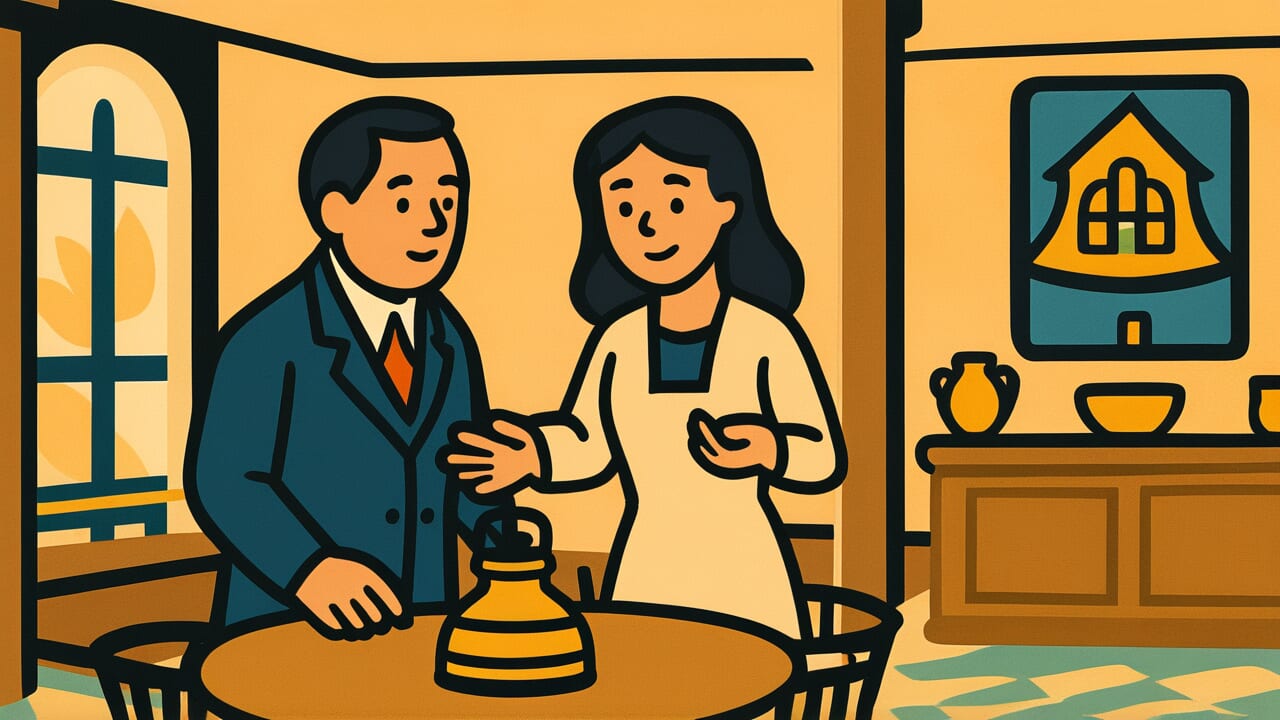How to Read “Wealth enriches the house, but virtue enriches the person”
Tomi wa oku wo uruosu mo toku wa mi wo uruosu
Meaning of “Wealth enriches the house, but virtue enriches the person”
This proverb means that money enriches your home, but virtue enriches who you are as a person. With money and possessions, you can live in a nice house and enjoy a comfortable life. But that’s only external richness.
On the other hand, building virtue means acting with integrity and showing kindness to others. This makes your inner self shine and increases your value as a human being.
People use this proverb when they want to question a lifestyle focused only on material wealth. Money is important, but what matters more is your character and inner richness.
In modern society, we tend to focus on visible success and possessions. This saying encourages us to rethink what true richness really means.
Origin and Etymology
The exact source of this proverb is debated. However, it likely developed in Japan under the influence of Chinese classical thought, especially Confucianism.
Ancient Chinese thinkers repeatedly discussed the contrast between wealth and virtue as a central theme.
The structure of the phrase uses a striking parallel construction. “Enriches the house” contrasts with “enriches the person.” The house represents the outer container, while the person represents the inner self.
This contrast vividly highlights the difference between external and internal richness.
The choice of the word “enriches” is also interesting. It carries the nuance of gradually soaking in, like water seeping through. Wealth certainly enriches a house, but only the building and living environment.
Virtue, however, enriches the person from the inside out, like something seeping outward from within.
Similar expressions appear in Edo period moral instruction books. This suggests the teaching spread not just among samurai, but also among merchants and common people.
It taught the balance between material and spiritual richness. Japanese people have long been aware of the difference between what money can and cannot buy.
Usage Examples
- He succeeded in business and built a mansion, but wealth enriches the house, but virtue enriches the person, so he should remember to grow as a person too
- I was only thinking about making money, but I realized that wealth enriches the house, but virtue enriches the person, so I decided to start volunteering
Universal Wisdom
Humans have always struggled between two kinds of richness. Visible richness and invisible richness. This proverb has been passed down for so long because people have always faced this question.
What’s interesting is that this proverb doesn’t reject wealth. It acknowledges that “wealth enriches the house.” Money does make life more comfortable. That’s a fact.
But it doesn’t stop there. It continues with “but” and shows another truth. No matter how much wealth you accumulate, it only decorates your exterior. It doesn’t make you grow as a person.
Everyone knows this truth somewhere in their heart. You can live in a big house or drive a luxury car, yet still feel empty inside.
Meanwhile, you might be drawn to someone living simply but with pride. That’s because virtue enriches the person.
The deep human understanding in this proverb recognizes that external and internal richness are separate things. You can inherit wealth, but you cannot inherit virtue.
Wealth can be stolen, but virtue cannot be taken by anyone. Our ancestors knew that what truly belongs to you is only what you cultivate within yourself.
When AI Hears This
Physics has a law that says “things left alone always become disordered.” A new house falls apart without maintenance, and money decreases when spent. This is the law of entropy increase.
Wealth follows this law exactly. A house as a physical object deteriorates from wind and rain. Wealth requires constant energy input to maintain. Wealth must constantly fight against “the force that scatters.”
But virtue has the opposite property. The more you act kindly, the more that behavior pattern strengthens in your brain. Neuroscience shows that repeated actions thicken neural pathways and become more automatic.
In other words, the more you use virtue, the more “order increases.” This resembles negative entropy in biology. It’s a phenomenon that organizes itself against disorder.
Even more interesting is that virtue amplifies through interaction with others. Once formed, a network of trust spreads in a self-reinforcing way.
This is like crystal growth, where information creates order. While wealth deteriorates as an isolated system, virtue grows as an open system exchanging energy with the outside.
This contrast captures the essential difference between matter and information.
Lessons for Today
This proverb teaches you the wisdom to identify where to invest your life. Every day, we choose how to spend our time and energy.
Increasing income and living in a better house are certainly important. But are you spending as much time, or even more, polishing yourself?
Specifically, this means cultivating inner qualities like honesty, compassion, gratitude, and a learning mindset. Rather than buying expensive things to show off on social media, help someone in need.
Rather than stepping on others for promotion, think about the whole team’s growth. These accumulated choices enrich you as a person.
What’s wonderful is that polishing virtue requires no age limit or money. You can start today, right this moment.
And once you develop virtue, it becomes your own treasure that no one can steal. Decorating the outside matters, but don’t forget to make the inside shine.
That’s the path that truly enriches you in the deepest sense.



Comments